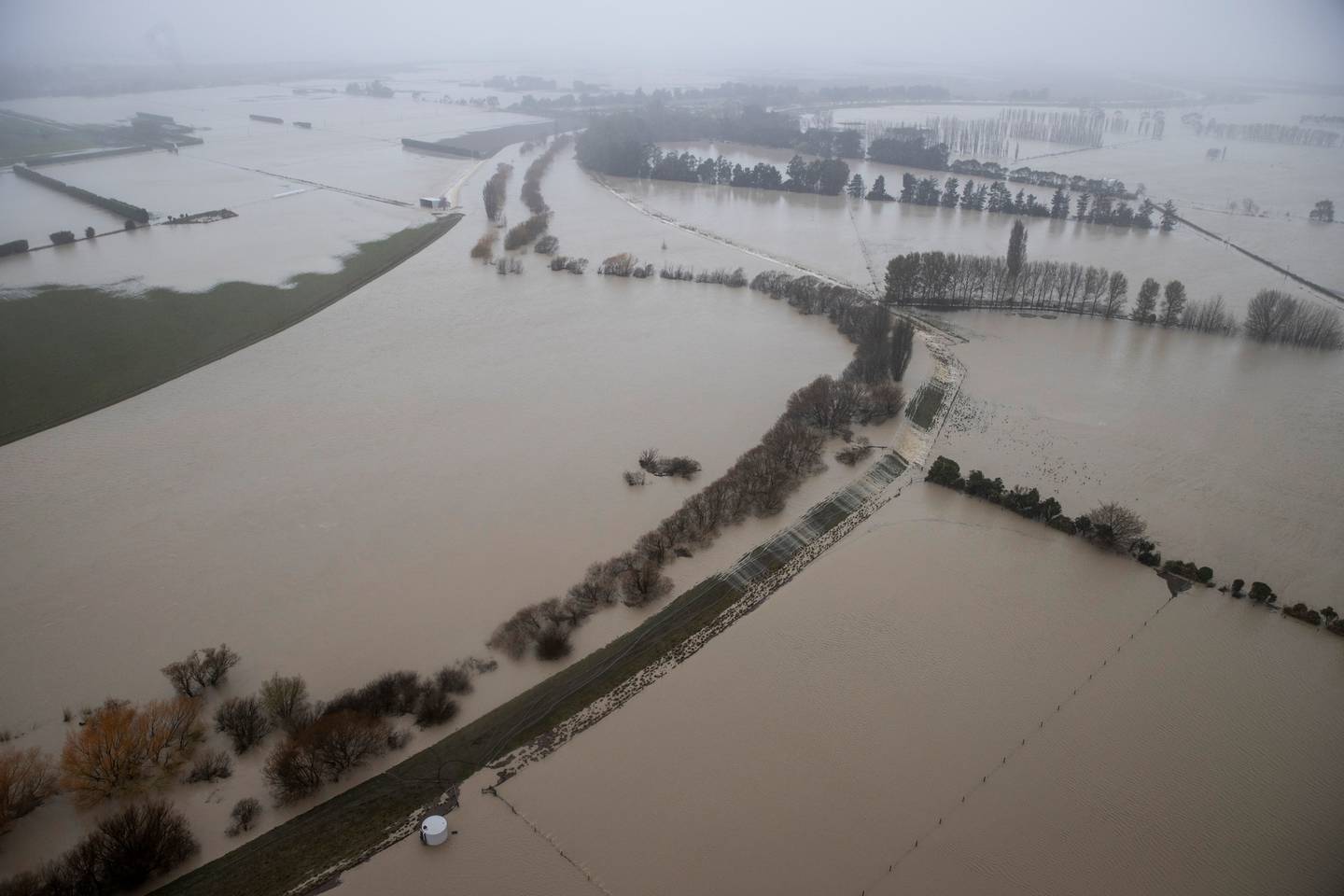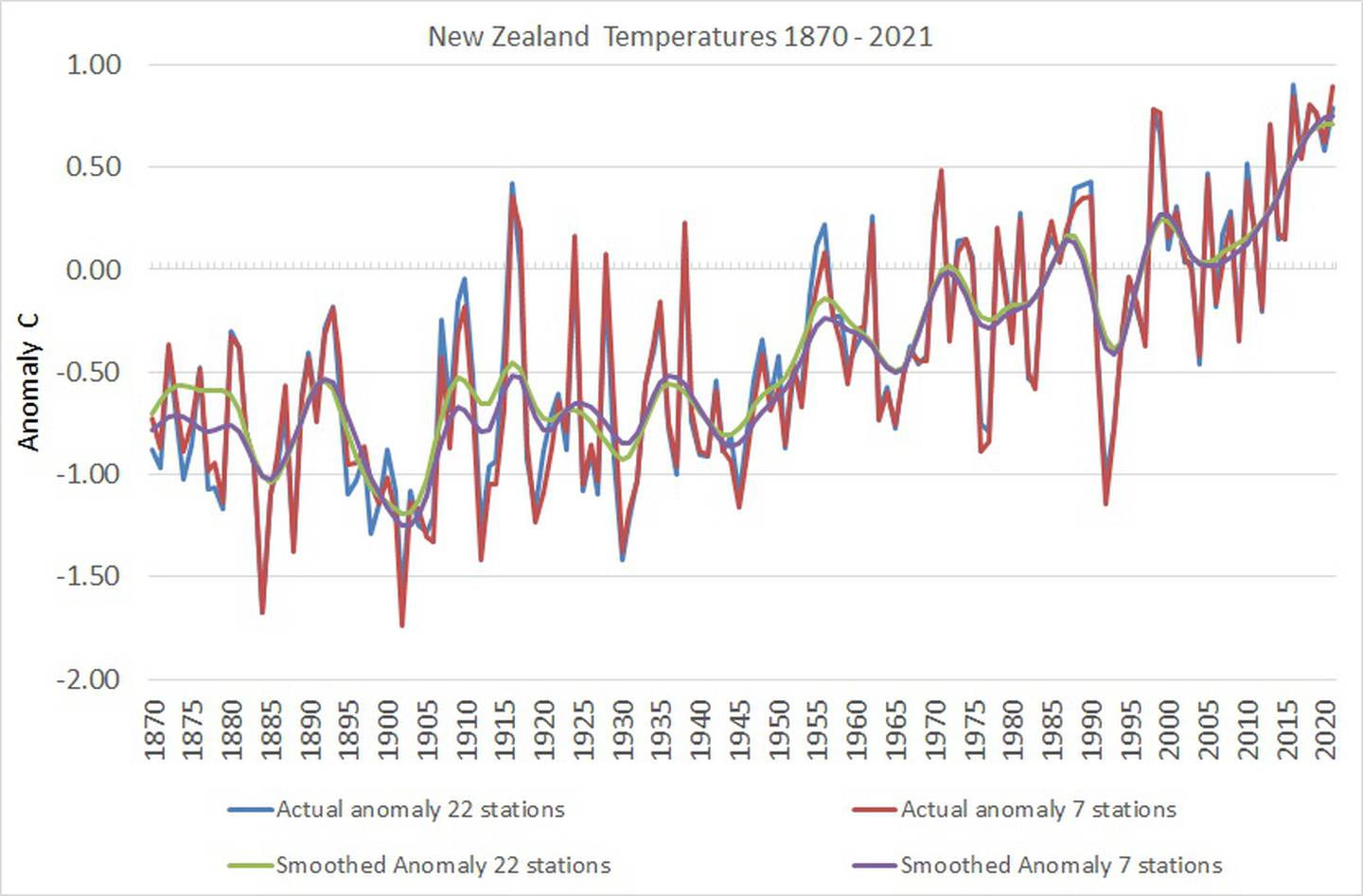
New Zealand just had one of its warmest years on the books – and one climate scientist's calculations put 2021 as our hottest.
Niwa isn't due to reveal the official temperature statistics for the year until next week, but says it was one of the top three warmest the country has experienced.
Veteran climate scientist Professor Jim Salinger told the Herald that, according to his analysis, the year finished with a record mean land surface temperature of 13.5C – or 0.9C above the 1981-2010 average.
Salinger said the year was also Auckland's hottest – with an average 16.4C, or 1C above average – as well as Dunedin's, at 12.3C, or 1.2C above average.
His calculations were based on the standard "seven-stations" temperature series that he helped develop, and which draw on more than a century of climate records taken from stations at Auckland, Wellington, Masterton, Nelson, Hokitika, Lincoln and Dunedin.
The warmest year on record to date has been 2016, when the nationwide average was 13.45C.
That was just ahead of second-equal years 2018 – which kicked off with New Zealand's warmest summer – and 1998, which began with an El Nino-fired drought that went down as among the worst in history.
Along with the influence of climate change, Salinger said last year's warmth was because of a mix of factors, including warmer seas and the effect of La Nina, which faded but then returned.
A separate climate indicator, called the tripolar index, had spent much of last year in a negative phase, which encouraged La Ninas and sea surface temperatures around New Zealand to be above average.
The year also delivered New Zealand's warmest winter – the previous record was set just the year before – along with its warmest June, its second warmest spring and its 10th warmest autumn.

A late May deluge that put swathes of Canterbury underwater and cost some $46m in insured losses was found to have been made 10 to 15 per cent more intense by climate change. Photo / George Heard
A series of tropically charged storms - including a disastrous Canterbury deluge found to have been 10 to 15 per cent more intense because of climate change - also made it one of our wildest years for weather.
Total weather-related insurance costs hit a record high in 2021 at $304.9m, beating the previous record, set in 2020, of $274m, according to the Insurance Council of New Zealand.
And insured losses were only part of the picture: taking under-insured and uninsured losses into account, the damage bill for the past two years could exceed a billion dollars.
Niwa forecaster Seth Carrier said Niwa scientists would be working through 2021's climate data over coming days.
"We really can't make an official determination until we quality control that seven-station series temperature data – and that's why we give it a few days to go through that process," he said.
"It's definitely going to be a top-three year – I don't think there's much question about that."
Across 30 locations, the annual average temperature has climbed at 28 over summer - and across all in winter - and six of the eight warmest years on Niwa's books have occurred since 2013.
In just 111 years, the average has risen by more than 1C. The starkest changes have come within the past three decades, when the pace of warming has tripled.

Source / Jim Salinger
Globally, human activities are estimated to have caused approximately 1.09C of global warming above pre-industrial levels.
According to the record of global land and ocean temperatures spanning 1880 to 2020, the seven warmest years have all been since 2014, and the 10 warmest years have occurred since 2005.
"Climate change still continues: for example, on January 1, the mercury hit 16.2C in London and 18.5C in the west of Scotland," Salinger said.
Meanwhile, a new Niwa-led analysis has found extreme high temperatures like those that have made for sweltering conditions around New Zealand this week are occurring far more often than expected.
Niwa researchers pored over 70 years of weather data to explore how frequently extreme events like record-breaking heatwaves have been happening – and found they were playing out at a much faster rate than the mean average temperature.
In the past decade, there were on average four to five times more extreme high temperatures than would be expected in a climate with no long-term warming.
Even with climate change considered, New Zealand still experienced two to three times more extreme high temperatures than expected.
Scientists also looked at rainfall, and discovered the country was experiencing dry conditions twice as frequently than expected on the east coast.

Aucklanders flocked to the Parnell Baths to beat the heat amid an ongoing New Year heatwave. Photo / Alex Burton
The study's lead author, Niwa climate database scientist Raghav Srinivasan, said this work provides the data to back up the anecdotal evidence seen and heard over the past few years.
"We instinctively know that we're experiencing more hot, dry days and record-breaking weather events, especially as they're often reported in the news," he said.
"This study has given context to this by showing the frequency of these extremes and how they have changed over the past seven decades in New Zealand."
Niwa published monthly climate summaries that reported extreme climate and weather events.
"In the last decade, Niwa has reported many record-setting high temperature extremes," Srinivasan said.
"We did this work to quantify those patterns and we can say much more confidently that climate change is no longer a thing of the future. It is happening to us now.
"The extreme events that we were once warned about are playing out across the globe, with droughts, storms and forest fires happening a lot more often than even just a couple of decades ago."
- by Jamie Morton, NZ Herald
Take your Radio, Podcasts and Music with you









